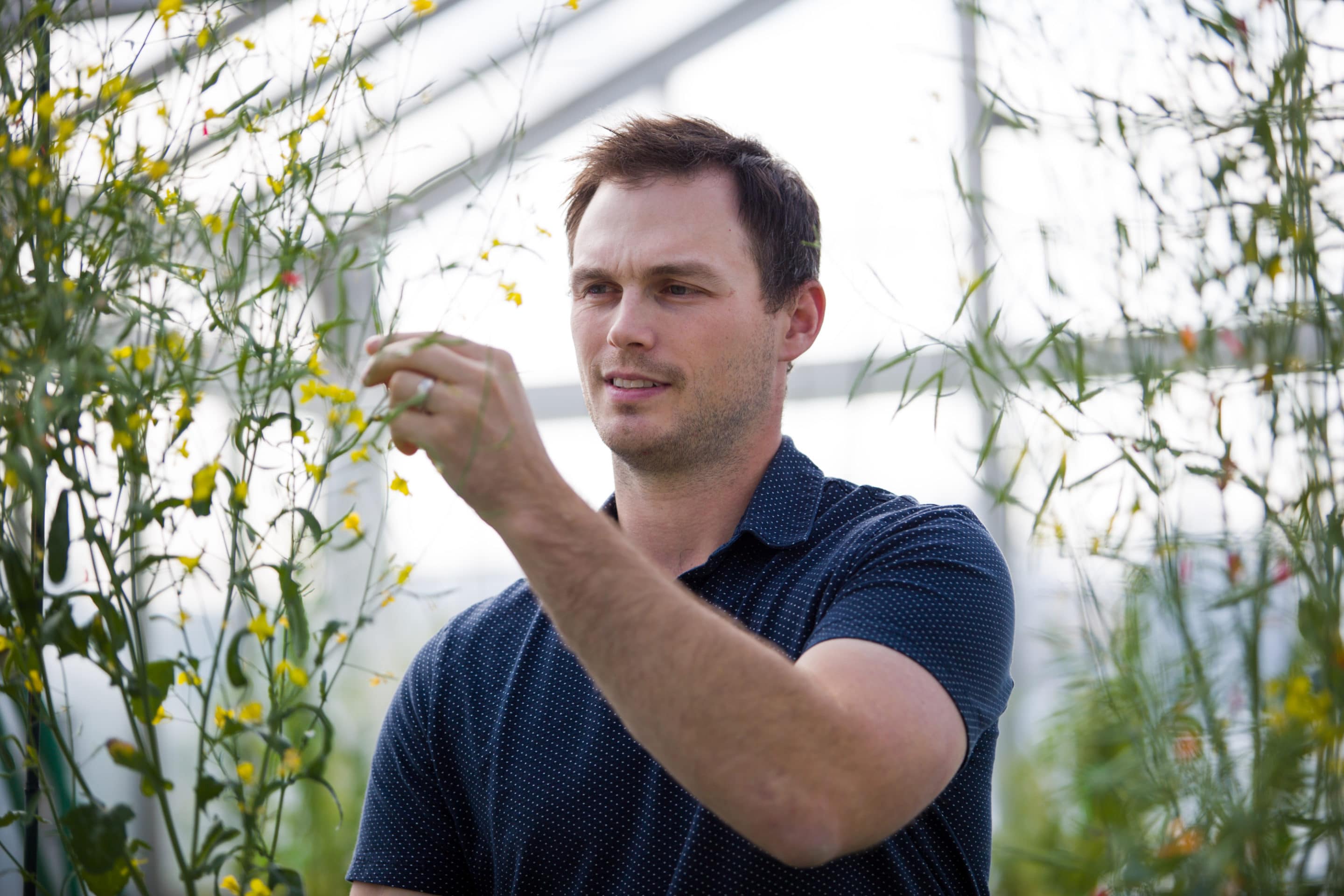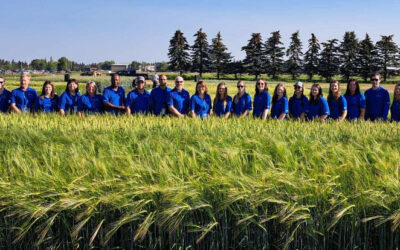Logan Skori is working to increase the protein content on crops across the Prairies.
Logan Skori wasn’t exactly sure what he wanted to be when he grew up. His family had a grain farm near Kinsella, Alta., which he worked on. When he graduated high school he went to the University of Calgary (U of C), but he was more focused on playing baseball there.
As his studies drew to a close, he found himself becoming more interested in biology. Skori first thought he could possibly go to medical school, but in his third year of school, plants caught his attention. He had worked summer jobs at Crop Production Services and Viterra, so his newfound interest seemed to make sense. Following university he accepted a job with Crop Production Services as a crop production advisor.
“I got to see a lot of the challenges that farmers and the plants face during the growing season. And I think at the end of the day, that was kind of what motivated me to go and do grad studies with a focus on biotech,” Skori explains in a phone interview.
Skori found himself back at U of C for his PhD studies. While working on his PhD research he discovered a way to boost the protein content in canola.
My studies have “given me an opportunity to take a plant and try to optimize it to grow better in its environment, but also, there’s a new focus on improving plants so that they can add value to farmers too,” he says.
From there the idea of Ag Gene was born. Skori won a Life Science Innovation Fellowship through Innovate Calgary, giving him a $200,000 grant to start up the company. And while he may not be a traditional plant breeder, he’s still working to improve crops across the Canadian Prairies by boosting their protein content.
New Protein Boosting Technology
AgGene was founded in December 2020 and since then it has been a whirlwind. Skori and his coworkers have been doing research and development, filing provisional patents and forging partnerships in the agriculture industry.

Logan Skori, co-founder of AgGene which increases plant protein content stands in a canola field. Photo: Adrianna Skori
AgGene uses favourable plant breeding tools to increase protein content. They have focused on using MAD7 gene editing to improve traits in plants, particularly protein content.
The protein boosting started with canola. While Skori was studying at the U of C he developed with colleagues a GMO canola where the protein content was increased by 20 to 25 per cent compared to the non-transgenic parents. Since then AgGene has moved away from the GMO approach and are now focused on gene editing.
“We’ve done preliminary evaluations, and we believe that the technology can be translated to soybean and in different pulse crops. Right now, our primary focus is actually on soybean and pea at the current moment. Canola is kind of number three in the chain,” he says.
Sarah Foster, president of 20/20 Seed Labs and AgGene board member, has found herself learning a lot about the molecular world of gene editing from Skori.
“By using this MAD7 gene editing technology it allows them to insert what they want, so if they want to increase protein, they can do it very quickly,” Foster says in a phone interview. “Gene editing is very, very new, and it’s really exciting.”
The plant disease tester was introduced to Skori four years ago through the Advancing Ag mentorship program and has been supportive of his work ever since.
The technology is still in its infancy, Skori explains. AgGene needs to evaluate it in greenhouse and field trials. He expects over the next two years Ag Gene will make significant progress on bringing crops with their traits in them closer to commercialization.
“The great thing about the technology is it can go into any variety. The group of genes that we work with are very similar across different crops. So I think one of the appealing things is we could integrate it into multiple varieties, multiple crops and see promising results,” he says.
AgGene is currently working to form relationships with pea and soybean companies to put their protein boosting technology into germplasms. AgGene plans to partner with other companies in order to get their technology on the market faster, instead of breeding their own varieties which would take more than a decade to do.
“He’s taking some taken huge steps. And I think it’s absolutely at the right time. He’s so innovative, and it’s just an exciting time for him, and I think it’s absolutely fantastic,” Foster says.
The Protein Future
With pulse processing facilities having been built recently across Western Canada, interest in plant protein is growing. Skori feels we’re just scratching the surface with plant protein and the industry will explode in the next five to 10 years.
“If we can really replicate a high level of protein increase in a number of different crops that are important to processing at the end of the day the protein processors themselves will be able to capitalize on this,” he explains.
Skori wants to keep the cost of protein low while also increasing the amount of it in plants. More people are trying to add protein into their diets and keeping the cost low is important from a consumer standpoint.
“It’s not just about protein for a health bar or drink, boosting protein for food and animal feed is vital in developing countries. There’s also a keen interest for protein in our diets and health products in first world countries too,” Foster says.
The opportunities to increase protein content doesn’t stop at peas and soybeans though, Skori sees possibilities for high protein leafy greens. He also thinks they can increase plant protein content for livestock feed.
“There’s so many there’s so many opportunities and different applications. So we’re being really open minded at this point,” he explains.
Header Photo — Logan Skori, co-founder of AgGene which increases plant protein content in a greenhouse. Photo: Riley Brandt, University of Calgary
Related Articles
Roadmap for Canada’s Plant Protein Sector Released





